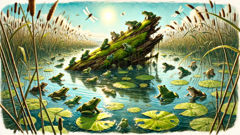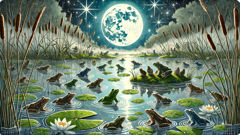Introduction
In the wild, green heart of Ancient Greece, where reeds whispered secrets and the morning mist clung to the water’s surface like a silvery veil, there was a marshland renowned among the animals for its abundance and beauty. This was not just any ordinary marsh; it was a vibrant tapestry woven from emerald water lilies, sapphire pools, and tall, swaying grasses, alive with the sounds of nature’s chorus. Here, frogs reigned—not as kings, but as a free and boisterous community. They filled the air with their croaks at dawn and dusk, their symphonies rising above the trickle of streams and the rustle of dragonfly wings. These frogs lived without rulers, governed by the rhythm of sun and moon, the gentle rules of nature, and their own ever-shifting councils. Life was a mixture of pleasure and peril: the joy of leaping between lily pads, the feast of buzzing insects, the thrill of summer storms. Yet, beneath this outward happiness, a seed of discontent began to grow. Some frogs, old and young, started to grumble about the absence of order. They longed for structure, for someone to make decisions and ensure fairness—someone to look up to or blame. The council of elders, usually content to settle disputes over territory or mating rights, found themselves beset by complaints and anxious questions. "Why do we squabble endlessly? Why must the biggest frogs take the best sunning stones? Wouldn’t it be better if we had a leader—a king?" Rumors of other animal societies, ruled by majestic lions or cunning owls, reached the marsh through the stories of traveling turtles and birds. The frogs imagined how splendid it would be to have a mighty ruler of their own, someone to command respect, resolve conflicts, and make their marsh the envy of all creatures. Soon, the chorus of longing turned to a clamor, echoing in every pool and hollow. Ambition and curiosity sparked among them, mingled with fear of change and hope for greatness. One starlit night, under the pale gaze of the moon, the frogs gathered for a council that would alter their lives forever. The air trembled with anticipation, and even the breeze seemed to hush, listening as the frogs prepared to send their plea to the highest authority they could imagine—Zeus, king of the gods, the wielder of thunderbolts and the master of fate. Their wish was simple, or so they thought: "Send us a king!" But wishes, as the frogs would soon discover, carry shadows and consequences, and the marsh’s serenity hung in the balance.
The Longing for a King
Dawn crept gently over the marshland, painting the world in hues of rose and amber. The frogs, still drowsy from the night’s discussions, began their morning routines: stretching sticky limbs, shaking off droplets of dew, and resuming their endless croaking. But beneath this familiar scene, a subtle shift had taken place. Something new buzzed in the air—an anticipation, a sense of purpose that replaced the usual languor of dawn. The younger frogs, their skin still bright and their eyes full of dreams, were the first to take up the cause. They gathered in clusters along the banks, whispering about the wonders a king might bring: feasts of the fattest flies, contests of strength and wit, parades through the marshlands. The elders watched with concern, their memories stretching back to years when unity had been enough. In the heart of the marsh, on the largest lily pad—dubbed the “Assembly Pad” by generations—the council gathered to debate the wish that now gripped every tongue. Stentor, an ancient frog with mottled green skin and eyes clouded by time, cleared his throat. “Frogs, we have thrived under the sun and stars without a king. Why invite chains into our home?” But his words were drowned by a chorus of eager voices. “Order! Protection! Glory!” they croaked. Even those who hesitated found themselves swept along by the tide of excitement. They imagined a ruler who would bring wisdom and prosperity, whose name would be whispered in awe by birds and beetles alike. By midday, the debate reached a fever pitch. Frogs leapt from pad to pad, calling for a decision. Finally, it was agreed—a delegation would be sent to the edge of the marsh where the world met the sky. There, they would croak their plea to the mighty Zeus, trusting that their voices would rise above the reeds and reach the gods on Mount Olympus. At twilight, as golden light bathed the water in molten color, the chosen frogs assembled: bright-eyed Eurymedon, wise Stentor, bold young Phaedra, and cautious Melite. They climbed a mossy log that jutted toward the open sky and began their chorus. "Zeus! Thunderer! Hear us! Grant us a king to rule our marsh! Send us someone noble, just, and wise!" Their voices blended into a single, urgent call. Somewhere far above, beyond mortal sight, the king of the gods paused. Zeus, whose whims shaped destinies and whose laughter could shake mountains, heard the frogs’ request. He raised an eyebrow, a thundercloud curling around his brow, and mused on their audacity. "So, they wish for a king? Let them learn what that means," he murmured. In an instant, he plucked a great log from a distant forest, polished it smooth with divine hands, and hurled it down from the heavens. The log crashed into the center of the marsh with a mighty splash, sending ripples that rocked every lily pad and startled every frog into silence. For a heartbeat, time seemed to pause. The frogs froze, eyes wide with awe and terror, as the water settled around this unexpected visitor.

The Reign of Silence
The log, broad and mossy, floated serenely at the heart of the marsh. Its arrival was met with reverence and dread, for it had fallen from the sky—surely a sign of the gods’ power. For hours, none dared approach. Frogs huddled at the edges, whispering rumors: “It’s enchanted! It will speak!” Some insisted the log was a disguised hero or a sleeping dragon, sent to test their worth. As dusk fell, curiosity overcame fear. Eurymedon, brave as ever, crept forward and prodded the log with his webbed foot. It did not stir. Phaedra followed, then Melite, until a cluster of frogs perched upon the log’s slick surface. It was warm from the afternoon sun and smelled faintly of distant woods. The assembly waited for commands or signs. But the log remained silent. Days passed. The frogs tried everything—croaking songs of praise, bringing offerings of insects, even dancing in circles atop their “king.” But still, it did nothing. The log was unmoved by disputes or celebrations; it offered no judgments, no decrees, not even a blink or a twitch. Some frogs found comfort in its silence. "Perhaps this is best," mused Melite. "We have a king who harms no one and interferes with nothing." Others grew restless. They had imagined a monarch who would dazzle, who would bring order and spectacle. Instead, they received an inert, wooden presence—a king in name only. The bolder frogs began to mock their new ruler. They leapt on and off the log, staged plays about its laziness, and invented games to see who could leap farthest across its girth. Soon, the log was just another piece of furniture in the marsh—a sunning spot, a playground, a prop for their antics. Still, beneath the laughter, resentment simmered. “Is this what Zeus thinks of us?” grumbled one elder. “Are we to be ruled by wood?” The marsh echoed with complaints. The dream of order had become a farce. One sultry afternoon, as dragonflies skimmed the water’s surface, a group of young frogs gathered at the edge of the assembly pad. “We asked for a king,” said bold Phaedra, “not a lump of timber! We need a ruler who will make us strong—someone to command respect!” The sentiment quickly spread. Emboldened by their shared disappointment, the frogs resolved to try again. They gathered at sunset, their croaks rising in a unified plea: “Zeus! Give us a real king! Someone powerful! Someone who will lead us and make us feared!” Their voices rang out over the marsh, drifting up toward Olympus with urgent persistence.

The Coming of the Water Snake
Their second plea did not fall on deaf ears. Far above, Zeus watched with a wry smile as the frogs’ impatience grew. With a gesture as subtle as a sigh, he summoned a new ruler—one with scales, fangs, and the glint of hunger in its eyes. In the marsh’s deepest pool, where shadows ran thick and cool, something stirred. The reeds trembled. The water split as a sinuous form glided into view—a water snake, gleaming with emerald and silver, eyes as cold as moonlit stones. The frogs sensed the change at once. Their songs faltered; laughter died on their lips. The snake was swift and silent, weaving between lily pads like a ribbon of living darkness. At first, the frogs watched in fascination. Here was power incarnate—a king who needed no crown or scepter. The water snake wasted no time in asserting its rule. With a flick of its tongue and a flash of movement, it struck at the nearest frog. There was a splash, a frantic struggle—and then silence. Panic erupted across the marsh. Frogs scattered to the farthest edges, hiding beneath leaves and burrowing in mud. The carefree days of leaping and singing vanished. Every sunbeam seemed laced with dread; every ripple might be a snake’s approach. The water snake patrolled its new kingdom with tireless hunger. It took what it wished, showing neither mercy nor interest in their affairs. Arguments ceased—there was no point in quarreling when any movement might draw the snake’s attention. The log, once mocked, became a refuge. Frogs huddled atop it, trembling and silent, wishing only for safety. Eurymedon, who had once dreamed of parades and contests, now shivered at dusk and whispered regrets to the stars. Phaedra’s boldness faded into anxiety; Melite’s caution became fear. The marsh was united not by joy or ambition, but by terror. Weeks passed. The frogs shrank in number and spirit. The marsh itself seemed changed—quieter, lonelier, the joyous chorus replaced by furtive croaks and splashes of escape. In desperation, the surviving frogs assembled one final time. Their plea was no longer for power or glory, but for mercy. "Zeus! Take away this king! Give us back our freedom!" they begged, voices hoarse with regret. High above, Zeus listened with ancient wisdom. His voice rumbled across the sky—a rare and awe-inspiring sound. "You asked for a king, not once but twice. Now you see the price of power and the cost of longing for what you do not need. Be content with your freedom, for not all rulers bring happiness."

Conclusion
When the storm finally broke and the water snake slithered away to seek prey in another marsh, the frogs emerged—changed, wiser, and deeply humbled. Their freedom restored, they no longer clamored for rulers or envied other creatures’ kings. The log remained, not as an object of ridicule, but as a gentle reminder of their folly and the unpredictable nature of wishes. Gradually, life returned to the marsh: songs at sunrise, playful leaps at dusk, small disputes settled with laughter and compromise instead of decrees. The community grew stronger in its self-reliance, each frog understanding that wisdom often lies in contentment, and that true harmony does not need a crown. As seasons passed, young tadpoles listened wide-eyed to the elders’ tale—the story of how their ancestors had once desired a king and learned a lesson that echoed through generations: be careful what you wish for, for not every change brings happiness. In the shimmering marshes of Ancient Greece, the frogs’ chorus rose again—not in fear or ambition, but in celebration of the simple joys of life and the enduring gift of freedom.













